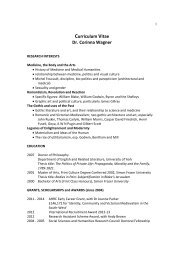'Cast out into the hellish night': Pagan Virtue and ... - Humanities
'Cast out into the hellish night': Pagan Virtue and ... - Humanities
'Cast out into the hellish night': Pagan Virtue and ... - Humanities
You also want an ePaper? Increase the reach of your titles
YUMPU automatically turns print PDFs into web optimized ePapers that Google loves.
Philippa Byrne Ex Historia 54<br />
Manetti (c.1396-1459) had recognised this problem, <strong>and</strong> in his biography of Seneca addressed<br />
Quintilian’s criticism of <strong>the</strong> Stoic philosopher. Manetti maintained that Quintilian, ano<strong>the</strong>r<br />
Spanish orator competing for <strong>the</strong> limelight, had sl<strong>and</strong>ered Seneca <strong>out</strong> of oratorical envy, not<br />
because of his lifestyle. 28 Leonardo Bruni, Valla’s friend <strong>and</strong> mentor, essayed a different approach<br />
in his Life of Aristotle, when considering how <strong>the</strong> Stagirite’s deeds related to his teachings on <strong>the</strong><br />
moral life. Bruni asserted that <strong>the</strong> manner in which Aristotle had lived was far less important<br />
than his excellent precepts. 29 In De voluptate, Valla delivers an implicit rebuke to Bruni’s defence<br />
of <strong>the</strong> philosopher. Valla argues that Aristotle’s mode of death tells Christians all <strong>the</strong>y needed to<br />
know ab<strong>out</strong> his life. He recounts <strong>the</strong> legend that Aristotle, when he finally encountered a concept<br />
he could not comprehend, committed suicide by casting himself <strong>into</strong> <strong>the</strong> river Euripus.<br />
Aristotle’s death provided a salutary lesson on <strong>the</strong> dangers of pagan philosophy, for <strong>the</strong><br />
supposedly wise philosopher was ‘turned <strong>into</strong> a madman by immoderate greed for knowledge’. 30<br />
Yet Valla does much more than pick <strong>out</strong> individual philosophers <strong>and</strong> scrutinise <strong>the</strong>ir behaviour.<br />
He attacks <strong>the</strong> entire edifice of classical literature, engaging with a millennium-old question. The<br />
st<strong>and</strong>ard patristic argument, as formulated by Augustine, held that pagan philosophers were<br />
motivated solely by love of glory, <strong>and</strong> that desire for fame obscured <strong>the</strong>ir desire to be ethically<br />
righteous. 31 Many humanist scholars attempted to bridge <strong>the</strong> gulf between actions motivated by<br />
desire for glory <strong>and</strong> those done for love of virtue. The ‘secular immortality’ bestowed by fame<br />
was validated when cast as a ‘reward’ for virtue. On this basis, <strong>the</strong> political <strong>the</strong>orist Quentin<br />
28 Manetti, Life of Seneca, trans. by Stefano Ugo Baldassarri, Biographical Writings (London: Havard<br />
University Press, 2003), p. 235.<br />
29 Bruni, Life of Aristotle, trans. by Gordon Griffiths, The Humanism of Leonardo Bruni: Selected Texts<br />
(Binghamton: Medieval <strong>and</strong> Renaissance Library <strong>and</strong> Studies, 1987), pp. 288-9.<br />
30 De voluptate, 2.XXVIII.19 p.207; <strong>the</strong> legend is ultimately derived from Gregory Nazianzus. The criticism is<br />
repeated in Valla’s De libero arbitrio, trans. by Charles Trinkaus, in The Renaissance Philosophy of Man, ed. by<br />
Ernst Cassirer <strong>and</strong> o<strong>the</strong>rs (Chicago: University of Chicago Press, 1948), p. 181.<br />
31 Augustine, City of God, V.xii-xxi (Dyson, pp. 207-28).









